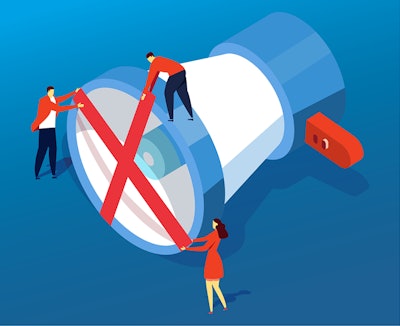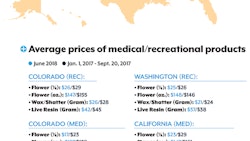
Working as a budtender is not all that different than working at any conventional retail establishment. Whether it is a small clothing boutique or a giant grocer, a liquor store or a medical cannabis dispensary, employees are expected to possess product knowledge, provide quality customer service and follow standard operating procedures (SOPs) for everything from conducting transactions to complying with public health and safety standards. That said, there are unique aspects of working at a licensed cannabis retailer, and they can cause trouble for employees, businesses and the entire industry.
Budtenders not only face background checks and mandatory licensing in some states, but they are asked medical and legal questions by consumers that their counterparts in other industries would rarely, if ever, encounter. For example, customers at a liquor store generally don't ask the clerk how much beer they should drink to feel the desired effects, or whether wine is helpful for someone with high blood pressure. It is difficult to imagine someone asking where he or she should go to drink their recently purchased whiskey.
It is understandable why cannabis customers have so many questions. Marijuana has been illegal for most of their lives (and still is at a federal level), and while more information is available now than only a few years ago, many people are still unfamiliar with it. When most people think of cannabis, they envision dry flowers, either in a joint or pipe, or possibly baked into a batch of brownies. They are not familiar with the panoply of strains, extracts, salves, edibles and other infused products available today. Not surprisingly, consumers who want guidance from a cannabis expert often look to dispensary employees for advice.
Don’t Cross the Line
While most budtenders are typically knowledgeable and aim to be helpful, they are not doctors and they are not attorneys. A fine line exists between providing advice on the appropriate cannabis product and making medical claims.
A study released in May 2018 by Colorado’s Marijuana Enforcement Division (MED) highlighted the sensitivities surrounding these types of communications between dispensary employees and the public. Researchers conducted a telephone survey in which two people posing as pregnant women called hundreds of adult-use and medical marijuana dispensaries in the Rocky Mountain State to ask whether they would recommend cannabis as a treatment for morning sickness. Roughly 69 percent of surveyed dispensary employees recommended cannabis, and nearly 36 percent told the callers it was safe to consume while pregnant. Less than one-third advised the callers to consult their health-care providers.
The results raised significant concerns among state health officials and regulators, and they highlighted an important question: Should budtenders be providing this type of medical advice?
Put simply: No, they should not. Whether it is a woman inquiring about cannabis for morning sickness or a man who is curious if it will negatively interact with his heart medication, these are questions that need to be directed to health care professionals.
Shortly after the study was published, the Colorado MED issued two strong warnings to industry participants, advising them that the prohibitions on making health or benefit claims in advertisements and on product labels also extends to budtender statements:
“Licensees (including owners, managers, and employees of medical and retail marijuana businesses) making health or benefit claims to consumers or otherwise communicating information that is prohibited from being advertised or displayed on labels affixed to Containers of Retail and Medical Marijuana, Concentrate and Product may be viewed by the Division as an attempt to evade marketing, advertising, and/or labeling requirements, resulting in recommendation for administrative action.”
The dispensary workers involved in the study were well intentioned, and it is possible that some are well versed on the medical research surrounding marijuana and pregnancy. Alas, they are not health care professionals, so they must be careful not to cross the line into providing medical advice.
That line can be difficult to define, though. What someone can say and how they can say it is fact-dependent. For example, if a budtender says that a product is "generally uplifting," that could be considered fine. If a customer asks a budtender if a product is helpful to treat depression and the response is that the product is "generally uplifting," then it could be considered medical advice.
Don’t be fooled into thinking this applies only to adult-use dispensaries, either. A common assumption is that medical dispensaries, and their employees, can bestow medical advice onto their patients. In the eyes of the federal law, there is no distinction between medical and retail dispensaries. In my experience, even state-level cannabis programs don’t make a distinction between dispensaries and typically prohibit any claims regarding health or benefits of cannabis consumption.
Helpful Alternatives
Instead, budtenders should follow clear talking points, established by their employers, that balance the desire to be helpful with the limitations placed on any non-medical professional. The same company-approved talking points and guidelines should cover questions about legal issues and the effects of cannabis (for example, when a first-time consumer asks how much he or she should consume and how long it will take to feel the effects; or when a customer asks if he or she can smoke a joint in his or her hotel room).
It is best for budtenders to simply avoid providing such advice, and critical that businesses arm budtenders with approved responses to these types of questions. Ad-libbing in these situations creates risk for everyone involved, including the employee, his or her employer, the industry, and of course, the consumer. Not abiding could result in enforcement from the Feds, fines and enforcement from state regulators, license suspension, employee termination and even product liability lawsuits.
It is up to cannabis businesses and industry organizations to ensure budtenders can properly address these consumer questions. Any non-compliance reflects poorly not only on the offending dispensary, but the entire industry and movement at large. Every day, more Americans support cannabis reform based upon the narrative that regulation works because industry participants stay compliant. If that narrative switches, we could see support for legalization begin to erode. Similarly, a customer that is given unproven or unsubstantiated health and benefit advice could begin to question the medical efficacy of cannabis and also lead to a decline in support for legalization.
Fortunately, huge strides have already been made when it comes to developing best practices and training employees. But this is just the beginning. New workers are joining the industry daily, laws and regulations are evolving, and new products are constantly being introduced to the marketplace. All of this produces an ongoing need for training and education.























